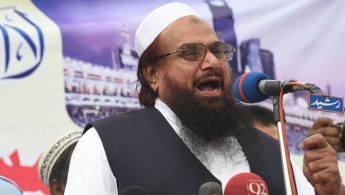Pakistan arrests 'Mumbai attacks mastermind' ahead of US visit
The arrest of Hafiz Saeed was welcomed by US President Donald Trump, who next week will host Pakistani Prime Minister Imran Khan during his maiden visit to the White House.
"After a ten year search, the so-called 'mastermind' of the Mumbai Terror attacks has been arrested in Pakistan," Trump wrote.
"Great pressure has been exerted over the last two years to find him!"
Saeed -- declared a global terrorist by the United States and the United Nations, and who had a $10 million US bounty on his head -- has in fact never been missing, but has instead for years rotated in and out of detention in Pakistan, sometimes under house arrest, sometimes briefly arrested then released by authorities.
His latest arrest was carried out in eastern Pakistan by counter-terrorism forces, a security official with knowledge of the arrest said.
"Hafiz Saeed was going to Gujranwala to apply for bail in another case when he was arrested," said the official, who requested anonymity.
Another security official said the arrest relates to terror financing charges.
A spokesman for Saeed's group, Jamaat-ud-Dawa (JuD), a wing of the militant organisation Lashkar-e-Taiba (LeT), confirmed the arrest to AFP, but gave no further details.
Saeed has spent most of him time outside of jail and moves around Pakistan at will.
That's enraged India, which has repeatedly called for Saeed's prosecution over his alleged role in the 2008 Mumbai attack that killed more than 160 people.
LeT is accused by India and Washington of masterminding the four-day assault. Saeed has denied involvement.
"The victims of terrorist attacks deserve justice," US acting assistant secretary of state for South Asia Alice Wells wrote on Twitter, calling for Saeed's "full and expeditious prosecution."
Blacklisting
Since taking office in 2017, Trump has frequently singled out Islamabad for failing to rein in extremists and being an unfaithful partner in the fight against militants.
Khan's visit to Washington is seen as an opportunity for mending the acrimonious relationship between the two countries.
Even before the Mumbai attacks, Washington and New Delhi urged Pakistan to take action against LeT, which was banned by Islamabad in 2002 but re-branded itself as JuD and Falah-e-Insaniat Foundation (FIF) -- both charities that have long been considered fronts for militant activity targeting India.
Earlier this year, Pakistan arrested more than 100 suspected militants and shuttered hundreds of religious schools.
The arrests came during an ongoing crackdown on extremists, following clashes with India after a Pakistan-based group killed dozens of Indian security forces in a February suicide bombing in Kashmir.
The attack led to both countries staging tit-for-tat air raids, igniting fears of an all-out conflict as world powers pleaded for restraint.
Pakistan is also facing a potential blacklisting by the Financial Action Task Force - an anti-money-laundering monitor based in Paris - for failing to do enough to combat terror financing.
The organisation is set rule on the country's fate in the coming months after placing it on a watch list last year.





 Follow the Middle East's top stories in English at The New Arab on Google News
Follow the Middle East's top stories in English at The New Arab on Google News


